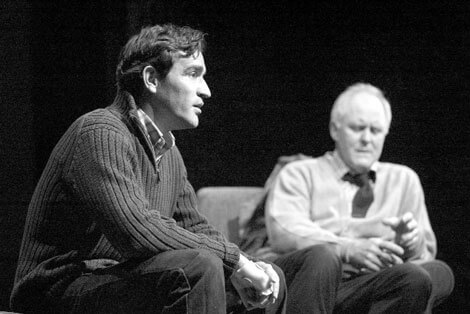Veteran stage stars lack the script, not the chemistry, to enliven mediocre play
It starts off as a son’s typical visit with his parents. There’s a lot of talking, but no one really says much of anything. Mom wants to know how her son’s love life is. Dad has his nose buried in a book.
It’s only when mom leaves the room and dad asks his son if he can “find a moment” to talk that you realize something very unpleasant is about to tear this close-knit family apart.
These are the deceptively tense opening moments of “The Retreat From Moscow,” William Nicholson’s occasionally poetic, but ultimately lifeless drama about the breakup of a marriage in modern-day Britain.
The show’s title refers to Napoleon’s disastrous invasion of Russia in 1812, a foolhardy maneuver that cost the lives of hundreds of thousands of soldiers. The play opens as Edward (John Lithgow), a history professor, reads aloud from a book about the very topic.
Listening to Edward is his strong-willed, but emotionally unbalanced wife Alice (Eileen Atkins), who’s compiling an anthology of poetry and who often peppers her speech with verse. At one point she half-jokingly refers to her own “retreat from Moscow” as a metaphor for her strained relationship with Edward.
Their only son Jamie (Ben Chaplin) acts as a mediator between the two, offering both his love and attention to a couple whose marriage of 33 years has been sturdy, if not successful.
When Edward reveals to Jamie that he plans to leave Alice for another woman, it sets into motion the play’s sterile story. Although Alice has been keenly aware of her marital problems over the years, she is unprepared for her husband’s revelation.
She begs for his return in coaxing letters, phone calls, and visits to his school. When that fails, she lashes out in anger, accusing him of literally murdering her with his actions.
Jamie’s allegiances are torn between Edward, whose compassionate nature he respects, and Alice, whose love he cherishes. There’s not much he can do but watch as his father finds happiness with his new love while his mother toys with thoughts of suicide.
To Nicholson’s credit, he makes it easy to identify with all three characters, refusing to turn any of them into demons or saints. Anyone who has experienced the pain of divorce will identify with familiar pain in this story which Nicholson based on his parents’ own breakup.
But as tied as it is to the themes of loss and betrayal found in the works of an Anton Chekov, the maudlin, dryly-told tale in “The Retreat From Moscow” ultimately fits better in the foggy emotional ether world of an Oprah Winfrey.
Blame it on the British and their stiff upper lips, but the characters’ occasional flashes of anger, frustration, and sadness are predictable and oddly blank. Overall the script has the feel of a made-for-TV movie, although John Lee Beatty’s handsome set (the stage is framed by naked branches criss-crossed like untamed kudzu) lends the show some un-TV-like elegance.
The play is Nicholson’s first Broadway production since 1991’s “Shadowlands,” which starred Nigel Hawthorne and Jane Alexander. Here he assembles a similarly talented cast.
Atkins’ smartly unassuming performance alternately mirrors and overcomes the featureless script. When she says she feels “no expectation of happiness,” the heartbreak in her voice is palpable, but not overwhelming.
Lithgow returns to the Broadway stage after “The Sweet Smell of Success” in a role tailor-made for the ease with which his character plays an awkward situation. His awakening in the second act is beautifully underhanded.
The handsome Chaplin perfectly underplays as a young man coping with his parents’ divorce. He breathes life into a character who, in the hands of a less sensitive actor, could have faded into the background as nothing more than a sounding board.
Strangely, Nicholson does a quiet little dance around Jamie’s sexuality. When Alice bugs him about his love life, Jamie remains quiet, demanding that she respect his need for privacy.
Jamie continues to dodge the question until late in the play, when he refers to a failed relationship with another woman.
Piece the clues together and you get a 32-year-old only child bachelor who lives alone and refuses to discuss his love life with his parents – a recipe for a gay son if ever there were one.
But later, in the show’s funniest scene, Alice confides in Jamie that she’s been volunteering at an AIDS hotline, where she’s met gay men whose sensitivity toward the suffering of others she admires.
When she suggests that Jamie might be gay, he denies it, and quickly changes the subject, suggesting, rather unsatisfyingly, that his true sexual identity will remain an unanswered question in this family.
It’s a shame that not even an accomplished cast can save “The Retreat From Moscow” from its sour two hours. Call it an American penchant for raw drama, but I kept waiting for an “Ordinary People” moment of catharsis, a revelation delivered with a bang, not a sigh.
Instead, the result is an ordinary story of ordinary people coping with what amounts to a rather ordinary breakup.
Such remove may play well in Britain, but on this side of the ocean it just feels fusty and tired, enough to make you quietly anticipate your own retreat — from the theater.


































